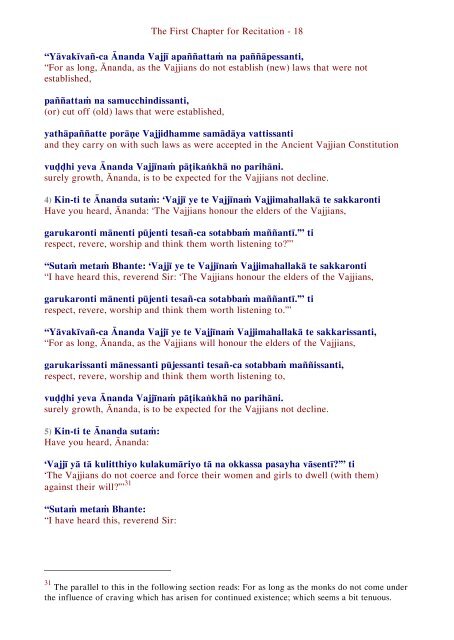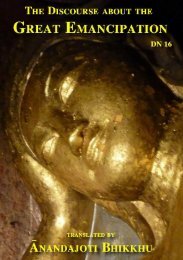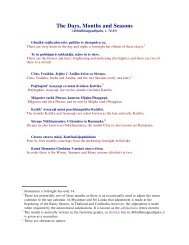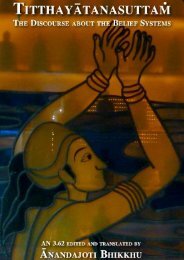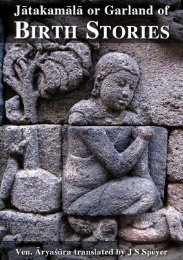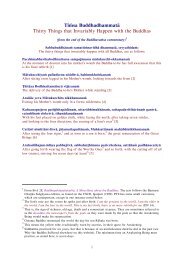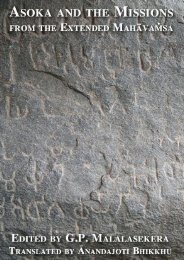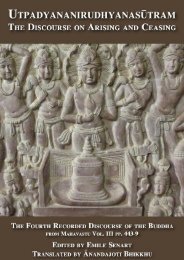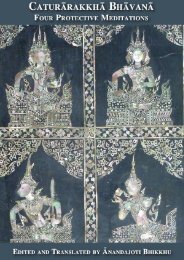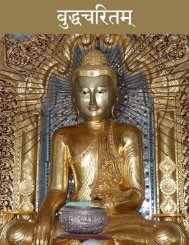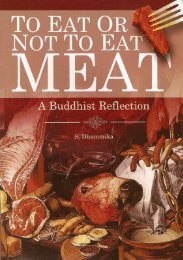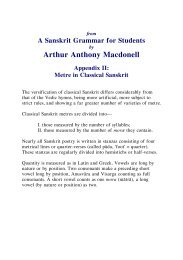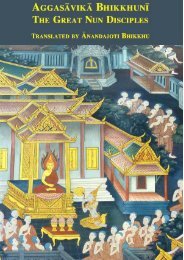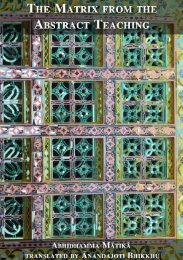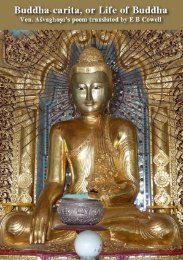Mahaparinibbanasuttam (DN 16) - Ancient Buddhist Texts
Mahaparinibbanasuttam (DN 16) - Ancient Buddhist Texts
Mahaparinibbanasuttam (DN 16) - Ancient Buddhist Texts
Create successful ePaper yourself
Turn your PDF publications into a flip-book with our unique Google optimized e-Paper software.
The First Chapter for Recitation - 18<br />
“Yāvakīvañ-ca Ānanda Vajjī apaññattaṁ na paññāpessanti,<br />
“For as long, Ānanda, as the Vajjians do not establish (new) laws that were not<br />
established,<br />
paññattaṁ na samucchindissanti,<br />
(or) cut off (old) laws that were established,<br />
yathāpaññatte porāṇe Vajjidhamme samādāya vattissanti<br />
and they carry on with such laws as were accepted in the <strong>Ancient</strong> Vajjian Constitution<br />
vuḍḍhi yeva Ānanda Vajjīnaṁ pāṭikaṅkhā no parihāni.<br />
surely growth, Ānanda, is to be expected for the Vajjians not decline.<br />
4) Kin-ti te Ānanda sutaṁ: ‘Vajjī ye te Vajjīnaṁ Vajjimahallakā te sakkaronti<br />
Have you heard, Ānanda: ‘The Vajjians honour the elders of the Vajjians,<br />
garukaronti mānenti pūjenti tesañ-ca sotabbaṁ maññantī.’” ti<br />
respect, revere, worship and think them worth listening to?’”<br />
“Sutaṁ metaṁ Bhante: ‘Vajjī ye te Vajjīnaṁ Vajjimahallakā te sakkaronti<br />
“I have heard this, reverend Sir: ‘The Vajjians honour the elders of the Vajjians,<br />
garukaronti mānenti pūjenti tesañ-ca sotabbaṁ maññantī.’” ti<br />
respect, revere, worship and think them worth listening to.’”<br />
“Yāvakīvañ-ca Ānanda Vajjī ye te Vajjīnaṁ Vajjimahallakā te sakkarissanti,<br />
“For as long, Ānanda, as the Vajjians will honour the elders of the Vajjians,<br />
garukarissanti mānessanti pūjessanti tesañ-ca sotabbaṁ maññissanti,<br />
respect, revere, worship and think them worth listening to,<br />
vuḍḍhi yeva Ānanda Vajjīnaṁ pāṭikaṅkhā no parihāni.<br />
surely growth, Ānanda, is to be expected for the Vajjians not decline.<br />
5) Kin-ti te Ānanda sutaṁ:<br />
Have you heard, Ānanda:<br />
‘Vajjī yā tā kulitthiyo kulakumāriyo tā na okkassa pasayha vāsentī?’” ti<br />
‘The Vajjians do not coerce and force their women and girls to dwell (with them)<br />
against their will?’” 31<br />
“Sutaṁ metaṁ Bhante:<br />
“I have heard this, reverend Sir:<br />
31 The parallel to this in the following section reads: For as long as the monks do not come under<br />
the influence of craving which has arisen for continued existence; which seems a bit tenuous.


